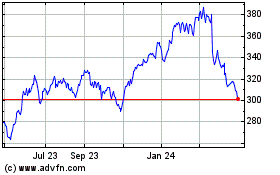Citizen Enthusiasm for Personalized Government Services and Digital Innovation Are on the Rise, Accenture Survey Finds
September 20 2018 - 7:07AM
Business Wire
Greater comfort with artificial intelligence a
factor in increased expectations for government innovation
Enthusiasm for artificial intelligence (AI) is helping to drive
heightened citizen expectations for government innovation and
personalized services, according to results of a multi-country
survey from Accenture (NYSE: ACN).
The survey of more than 6,000 citizens from Australia, France,
Germany, Singapore, the United Kingdom and the United States found
that citizens overwhelmingly favor an increased government focus on
the digital delivery of public services — including more
personalization — and easier, more-secure ways to share and access
data. Most respondents (86 percent) view digital delivery of public
services as equally or more important to them than traditional
methods of public-service delivery.
The survey also found that as citizens increasingly access more
user-friendly AI-driven solutions in their daily lives, they expect
the same type of innovation to also ease their access to government
services. Specifically, nearly half of respondents (44 percent)
cited personalized services as a top priority when interacting with
government.
“Personalized digital government services are better equipped to
address the needs of the modern citizen,” said Mark Lyons, who
leads Accenture’s work to improve citizen services. “For instance,
information and services that a taxpayer sees on an agency website
should be more specific to individual needs, online use patterns
and how that person wants to interact with the government.
Personalized government entails an enhanced level of citizen
services based on factors such as preferences, age, demographics or
location, better meeting constituent needs and lifestyles.”
Survey findings show that respondents are willing to provide
personal information to access digital benefits and more
personalized government services. For instance:
- About four in 10 citizens (42 percent)
would willingly use “internet of things” devices to share personal
data with government to receive discounts or improved
services;
- Nearly three-quarters (73 percent) of
citizens would provide biometric data such as fingerprints, retinal
scans and voice ID to government in exchange for more-personalized
services; and
- More than half (54 percent) of citizens
would be willing to share their fingerprints in return for
more-personalized government services.
Additionally, the survey found that respondents are willing to
be active participants in the evolution of digital delivery of
government services. Forty-five percent of citizens said they would
be willing to participate in focus groups or committees to improve
a service they use, and half (51 percent) support the use of new
technologies such as AI and virtual reality to learn more about
government services and streamline applications for government
services like job applications, visas and passports, tax filings
and student loans.
The survey found that most citizens increasingly expect
government services to be provided digitally and are enthusiastic
about innovation around specific applications. For instance, half
(51 percent) of respondents said they would like to use an
AI-enabled chatbot to learn about visa requirements for
international travel; slightly more said they want human services
agencies to use AI to speed eligibility decisions (52 percent) and
better identify service needs (55 percent); and nearly six in 10
(57 percent) favor the use of virtual reality technology to create
immersive learning environments in higher education.
“As emerging technologies like AI, machine learning and robotics
create a new reality for public services, citizens desire rapid
government innovation,” Lyons said. “Public-sector employees will
be a critical component to meeting that expectation and to
advancing technology to better engage with citizens.”
Creating new digital tools and hiring employees with the
necessary digital skills are essential for government innovation,
the survey determined. Nearly half of respondents (44 percent) want
government to incorporate citizen feedback to improve digital
applications and services and nearly two thirds say it is important
for government to attract top talent capable of working with
emerging technologies.
MethodologyAccenture surveyed 6,000 citizens aged 18 or
older in Australia, France, Germany, Singapore, the United Kingdom
and the United States on a variety of public service issues and
topics. The survey was conducted online in May 2018. Results for
the full global sample are statistically significant with a
confidence level of 95 percent and a margin of error of +/- 3.1
percent.
About AccentureAccenture is a leading global professional
services company, providing a broad range of services and solutions
in strategy, consulting, digital, technology and operations.
Combining unmatched experience and specialized skills across more
than 40 industries and all business functions – underpinned by the
world’s largest delivery network – Accenture works at the
intersection of business and technology to help clients improve
their performance and create sustainable value for their
stakeholders. With 449,000 people serving clients in more than 120
countries, Accenture drives innovation to improve the way the world
works and lives. Visit us at www.accenture.com.
View source
version on businesswire.com: https://www.businesswire.com/news/home/20180920005008/en/
AccentureJoanne Veto, +1 703-947-2590+1 703-963-4212
(mobile)joanne.m.veto@accenture.com@JoanneVetoJoin us on
LinkedIn / Follow us on Twitter
Accenture (NYSE:ACN)
Historical Stock Chart
From Mar 2024 to Apr 2024

Accenture (NYSE:ACN)
Historical Stock Chart
From Apr 2023 to Apr 2024
